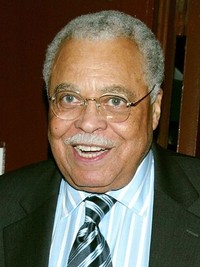James Earl Jones

With his deep resonant voice and imposing physical presence, James Earl Jones became one of the most easily recognizable figures in the entertainment industry. A native of Arkabutla, Mississippi, he spent most of his childhood in Michigan living with his grandparents. The move north was such a jarring event, that he developed a severe stutter and barely spoke until high school. With help, Jones overcame the stutter as a teenager and became involved in artistic pursuits. A theater major at the University of Michigan, he served in the military as an officer immediately after graduating. Once his service ended, he relocated to New York to pursue acting. He soon began appearing regularly both on and off Broadway. His voice and stature made him a natural for the lead role in Shakespeare's "Othello," a part that he would play in several productions throughout his career. He made his film debut when Stanley Kubrick cast him as a bombardier in his satire "Dr. Strangelove or: How I Learned to Stop Worrying and Love the Bomb" (1965). He had a prominent role in "The Comedians" (1967) opposite Richard Burton and Elizabeth Taylor, but his biggest break was still in the offing. Jones took the part of boxer Jack Johnson in the Broadway production of "The Great White Hope," earning a Tony award and critical acclaim. He went on to star in the 1970 film version, picking up an Academy Award nomination. Firmly established as an actor, he worked steadily from then on in film, television and stage. In the mid-1970s, a young filmmaker named George Lucas cast Jones as the voice of the villain in his sci-fi adventure "Star Wars" (1977). The character, Darth Vader, would become one of the greatest bad guys in history, and Jones continued providing the character's voice through the initial two sequels, "The Empire Strikes Back" (1980) and "Return of the Jedi" (1983), as well as a variety of ancillary projects over the subsequent decades. His voice became perhaps his greatest calling card, with his basso profundo closely associated with ads for Bell Atlantic/Verizon and on-air promotion for cable news giant CNN. While he worked regularly in film and on television, including starring in the short-lived series "Me and Mom" (CBS, 1985), he enjoyed an on-screen renaissance in the late-'80s. He played the African king father of Eddie Murphy in the blockbuster comedy "Coming to America" (1988). He then memorably joined Kevin Costner for the sentimental baseball film "Field of Dreams" (1989) playing reclusive writer Terence Mann. His soliloquy from the movie extolling the virtues of baseball would be played for years to come at stadiums across the country. In the '90s, he tried his hand again at series television, starring in "Gabriel's Fire" (ABC, 1990-91) and a reworking of the premise called "Pros and Cons" (ABC, 1991-92). His voice, though, would again make a bigger impact. Disney cast the actor as Mufasa, the leader of a lion pride and father of the protagonist Simba, in the animated hit "The Lion King" (1994). As with Darth Vader, Jones became so closely aligned with the character that he was asked to provide the voice again for Jon Favreau's blockbuster remake of the film in 2019. When not appearing on screen, the actor returned regularly to the stage, including a starring role in the initial Broadway run of August Wilson's acclaimed play "Fences." Jones later returned to familiar territory once more, joining Murphy for the long-gestating sequel "Coming 2 America" (2020).